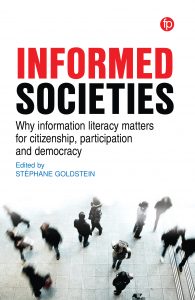
Gianfranco Polizzi is a PhD researcher in the Department of Media and Communications at the London School of Economics and Political Science. In addition, besides finishing his PhD, he is working as a Research Associate in the School of Education and Lifelong Learning at the University of East Anglia, working on a project on digital resilience among pre-teens.
That we live in a society where the scale of misinformation is unprecedented does not need convincing. Recent elections in the West, from the election of President Trump in the US to the Brexit referendum in the UK, have signalled the extent to which the internet can be used to distort or fabricate information in the hope of persuading voters. This is one of the reasons why the UK Government is currently developing a digital literacy strategy to make sure that children and adults are equipped with the skills and knowledge they need to engage critically with information in the digital age.

I recently wrote a chapter for a book that was published in January 2020 by Facet Publishing. Edited by Stéphane Goldstein, the book is titled Informed Societies: Why information Literacy Matters for Citizenship, Participation and Democracy. The book includes chapters from contributors across the world. As the title suggests, it looks at the importance of information literacy for democracy, with emphasis on misinformation, civic engagement and the role of libraries. The final published version of my chapter can be accessed here. And here, as follows, is a summary of what I argue in the chapter.
Information literacy and critical digital literacy
The concept of information literacy is overarching in that it refers to all information, be that mediated by digital technologies or not. Generally speaking, it is understood as the ability to access, locate, evaluate and use information. Digital literacy, instead, has to do with digital media and the internet. And it can be approached as twofold: functional and critical. On the one hand, functional digital literacy refers to the practical skills and knowledge that we need to use digital technologies. On the other hand, the critical dimension of digital literacy is generally understood as the ability to evaluate online content in relation to bias and trustworthiness. But as we live in an age that is highly mediated by digital technologies, critical digital literacy, as I previously discussed here, should be approached as incorporating an understanding of the political economy of the internet, including how internet corporations operate, the extent to which they collect users’ data for advertising purposes, and with what implications for privacy and data misuse (as demonstrated by the recent Cambridge Analytica scandal). Ultimately, furthermore, critical digital literacy should include an understanding of the potentials and limitations that the internet presents for democracy and civic life. The internet facilitates, for instance, marginalised groups’ participation in politics, interaction between citizens and politicians and collective action. At the same time, though, it also facilitates misinformation, polarisation and hate speech. And it can be used to suppress political dissent through censorship and surveillance.
Why critical digital literacy matters for democracy
It is often argued that critical digital literacy matters for democracy because it contributes to a well-informed citizenry that participates actively in society. But what does this mean? And what do we mean by democracy?
The dominant model of democracy that characterises Western societies goes under the name of liberal democracy, which refers to a system of governance based on representative institutions and principles of individual liberty and equality. According to democratic theory, on a descriptive level, such a system relies on citizens delegating power to politicians through elections. On a normative level, though, which has to do with how we conceive of democracy and expect it to function, democracy – and participation in democracy – can be understood in different ways.
In my book chapter, I reflect on how citizens’ skills and knowledge about the internet, which are necessary to participate in civic life, may be expected to vary depending on how we understand democracy. Here are four different models of democracy and why critical digital literacy is important:
1. Competitive elitist democracy
This model builds on liberal democracy’s emphasis on delegating power to representatives. In a competitive elitist democracy, which relies entirely on institutional politics and elections, citizens need critical digital literacy to evaluate online content in relation to bias and trustworthiness in order to form an informed opinion about competing parties and formal political processes. In addition, they need to understand how the information they come across is generated, including the impact of the internet on traditional media outlets, from its potential to democratise access to the news to the implications of online advertising for their business models.
2. Pluralistic democracy
This form of democracy prescribes that, besides delegating power to representatives through elections, citizens should engage more actively in democracy, which is why participation in civil society is particularly important in a pluralistic democracy. This includes, for instance, doing voluntary work and participating in non-institutional politics, from organising to taking collective action. As a result, in a pluralistic democracy, citizens need critical digital literacy to evaluate not just mainstream political content but also alternative media. In addition, they need to understand the internet’s potential for civil society, online communities and activism, and how it can be used for producing alternative media challenging dominant ideologies. Furthermore, they need to understand its benefits for organising protest events but also its implications for suppressing action through censorship and surveillance.
3. Participatory democracy
This variant of democracy is based on the idea that instead of delegating power to representatives, citizens should be directly involved in the process of decision making. As a result, unlike the two models above, this variant suffers from issues of time and size. It requires citizens to commit time to participate in civic life. And it hardly applies to complex systems like nation-states with large populations, working more feasibly at the level of communities, towns and cities. In a participatory democracy, citizens need critical digital literacy not just to evaluate online content but also to understand the role of the internet for participating in decision making. They need to understand, for instance, its potential to facilitate multi-stakeholder initiatives that bring different actors together to propose legislation. But they also need to be wary of its limitations for data security, which can undermine the possibility of gathering information as well as exchanging opinions or working collaboratively on a policy document.
4. Deliberative democracy
This model refers to a specific form of participatory democracy, one that is based on citizens’ public deliberation. On the one hand, thanks to its interactive features, the internet has made it possible for this model to transcend the problems of space and time that participatory democracy is subjected to. On the other hand, deliberative democracy suffers from issues of exclusion inherent in assuming that citizens should deliberate rationally. Politics is not just rational argumentation but also passion. This model of democracy, furthermore, assumes too easily that everyone has equal access to deliberation. As a result, in a democracy conceived of as deliberative, citizens need critical digital literacy, besides the ability to evaluate online content, to understand the internet’s potentials and limitations for deliberation in the context of government-led initiatives. They should understand, for example, that the internet facilitates connectivity, enabling marginalised groups to participate in the public sphere. But they should also be conscious that not everyone has access to the internet, that it can contribute to issues of government surveillance, and that online platforms use algorithms that affect online visibility, which can exacerbate polarisation and extremism.
In short…
Critical digital literacy is essential for participating in democracy in the digital age, in whichever way we conceive of democracy. But as we aim to promote critical digital literacy to ensure that citizens have the skills and knowledge they need to participate, we need to go beyond an understanding of critical digital literacy as relying exclusively on the ability to evaluate online content to incorporate knowledge about the broader digital environment. And before we can truly promote critical digital literacy, we need to ask ourselves: what model of democracy do we aspire to?


Pingback: Two parallel but disconnected tracks: Bridging media literacy and citizenship schooling | Iscuk